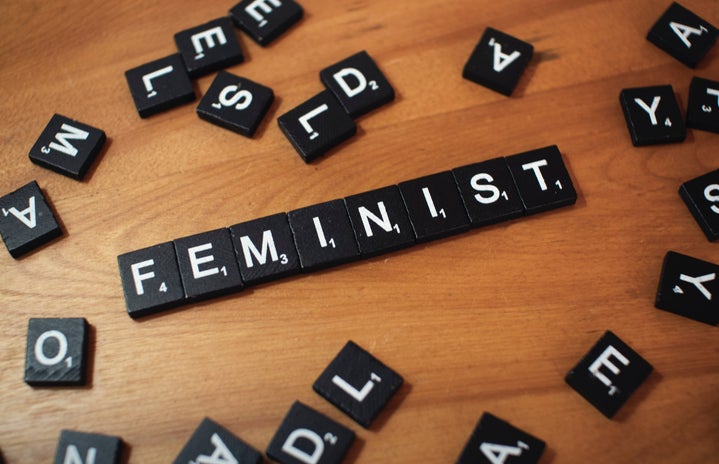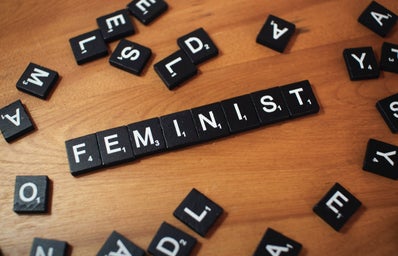I’m normally a lover of fiction books: fantasies, dystopias, periodical dramas – anything that can transport me from the here and now into a world far away. However, this year, in a departure from my norm, I’ve been compelled to read a lot of non-fiction, particularly feminist literature. It seems nonsensical that in 2020 – the most challenging year I’ve seen in my lifetime – I have opted to be ‘plugged in’ to the moment, rather than seeking escape from it in fiction. Yet rather than reading these non-fiction books and feeling despondent about the present and afeard for the future, the books I will be mentioning in this article are decidedly empowering and hopeful. Here are just three of some of the fantastic feminist books I have read over lockdown, and which I believe you should read too.
1. Invisible Women, Caroline Criado-Perez*
‘This book is honestly one of those books you feel like if everyone read it, the world would change.’ This was my one sentence review I posted on my Instagram story, after being blown away by the methodical and witty exposing (and dismantling) of the patriarchy that Criado-Perez achieves in her prose. The subtitle of the book promises a goal of ‘exposing data bias in a world designed for men’. I was initially hesitant to start this book, as I (wrongly) thought that a book that pitches data analysis as its selling point would be rather dry. This was not the case at all. Criado-Perez strikes a fine balance between data analysis (something which won her the Science book prize in 2019) and a compelling narrative, all married together through her tone, dry wit, and humour. Her focus on sex-disaggregated data (or often, the lack thereof in scientific study) means her research ranges from why women are more likely to die in a car crash, to how snow-ploughing is sexist. Here is a little excerpt to whet your appetite:
“There is no such thing as a woman who doesn’t work. There is only a woman who isn’t paid for her work. Globally, 75% of unpaid work is done by women, who spend between three and six hours a day on it compared to men’s average of thirty minutes to two hours. This imbalance starts early (girls as young as five do significantly more household chores than their brothers) and increases as they get older.”
Her decrying the term ‘working woman’ to be a tautology is brilliant, and just one of the many truths in this book that will infuriate you. However, It would be irresponsible of me to recommend this book without issuing a word of warning. Though the book is excellent, it is also so revealing and so angering that you will have to put it down and walk away from it every chapter or so, to stop yourself from throwing it out the window, or hitting the nearest man over the head with it.
2. The Guilty Feminist, Deborah Frances-White
I was drawn into purchasing this book after listening to the podcast of the same name very avidly for a year. Each episode is thoughtful, empowering, enlightening, and also hilarious. I often catch myself laughing out loud to it when listening in public – something which Deborah herself encourages with her mantra: ‘unexplained public laughter disrupts the patriarchy’. The book follows the same style of her podcast, and unpacks what it means to be a ‘guilty feminist’: ‘from our noble goals to our worst hypocrisies’. Each chapter starts with Frances-White’s signature ‘I’m a feminist but’, for example: ‘I’m a feminist but I used to think that The Feminine Mystique was a classic perfume, like Channel Number Five, not an important feminist text by Betty Friedan, and I only discovered it wasn’t when my university tutor asked me about how I felt it related to Sylvia Plath – and I replied I didn’t know she wore it.’ The content of the chapters themselves is both informative and uplifting; it reads a bit like a self-help book, signposting the tools and vocabulary to advocate for yourself, to say no, to stop apologising. It is unsurprising that this work was The Sunday Times Bestseller: Frances-White injects humour and verve into her conversations about feminism. She draws upon her personal experience – as an ex-Jehovah Witness growing up in Australia – and the voices of others in many written up interviews, ranging from Phoebe Waller-Bridge (acclaimed writer, producer, and actress, famous for both Fleabag and Killing Eve) to Leyla Hussein (advocate against FGM – Female Genital Mutilation – and creator of the Daliah Project). This book is best paired with the podcast that bore it: both forms of The Guilty Feminist will make excellent additions to your life.
3. Why I’m No Longer Talking to White People About Race, Reni Eddo-Lodge*
At first glance, this may seem like an outlier: it doesn’t have women or feminist in the title, and its buzzwords are ‘white people’ and ‘race’ – what’s that got to do with feminism? Well, as it turns out, a lot. Eddo-Lodge has an entire chapter on it entitled ‘The Feminism Question’, which is her second largest chapter after ‘Histories’. She shares her frustration with a ‘doggedly white-centric perspective from the [feminist] movement’s “leaders”’, finding that many people of colour feel this same frustration: that ‘gender equality must be addressed, but race could languish in the corner.’ She highlights that ‘when feminists can see the problem with all-male panels, but can’t see the problem with all-white television programmes, it’s worth questioning who they’re really fighting for.’ Putting feminism, especially ‘white feminism’ under a spotlight, Eddo-Lodge is able to demonstrate how feminism can fail some of the people it claims to advocate for when we ignore issues of race and misogynoir. She calls for the need of race analysis in feminism: for intersectional feminism, for white feminists to examine their white privilege and recognise that engaging with myths such as “I don’t see race” denies people of colour the words to articulate their existence. She argues that ‘incorporating the challenges of racism is absolutely essential for a feminist movement that doesn’t leave anyone behind. I’m not sure our most popular versions of feminism are currently up to that task.’ Not just the chapter, but the entire book demonstrates just how much work there is to be done around discourses of race, gender, class, and feminism. Eddo-Lodge ends her chapter on feminism with a bang:
“Feminism is not about equality, and certainly not about silently slipping into a world of work created by and for men. Feminism, at its best, is a movement that works to liberate all people who have been economically, socially and culturally marginalised by an ideological system that has been designed for them to fail. That means disabled people, black people, trans people, women and non-binary people, LGB people and working-class people. […] Feminism will have won when we have ended poverty. It will have won when women are no longer expected to work two jobs (the care and emotional labour for their families as well as their day jobs) by default.”
Eddo-Lodge argues that if we only traffic in palatable feminism, arguing feminists can wear heels and still be a #girlboss, or armpit hair is the sign or rebellion against the patriarchy, then we risk losing sight of the ultimate fight that unites us: dismantling the power structures which benefit a privileged few at the expense of the marginalised many. Unsurprisingly, this book is yet another Sunday Times Bestseller, as well as the winner of several other non-fiction book of the year awards, and is one that should be added to your list of books to read ASAP.
All three of these books, written by very different women with very different backgrounds, are also very different in tone, content, and style. Yet they are all passionate, beautifully written, informative pieces of work, united in their goal of dismantling the patriarchy and all symptoms of it in our society. For this reason, all three deserve pride of place in the modern-day feminist’s arsenal. If, like me, you usually reach for fiction when reading for pleasure, I would urge you to read one of these non-fiction books instead (or along with your fiction!) and watch them change your perspective on everything.
*It would be remiss of me to include both Caroline Criado-Perez and Reni Eddo-Lodge within the same article, and not address the encounter the two had on Woman’s Hour on BBC Radio 4, New Year’s Eve 2013. Eddo-Lodge explains it in detail in her chapter on feminism, so there is no need for me to hash it out in this article. My grouping them together in the same list of important feminist works of literature is in no way intended to be insensitive or antagonistic, rather both of their work is so ground-breaking that regardless of their past encounters, their work needs to be shared.



